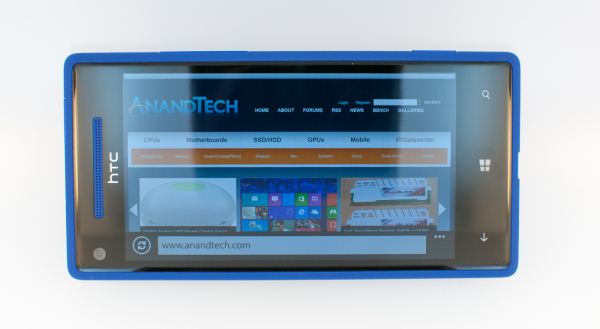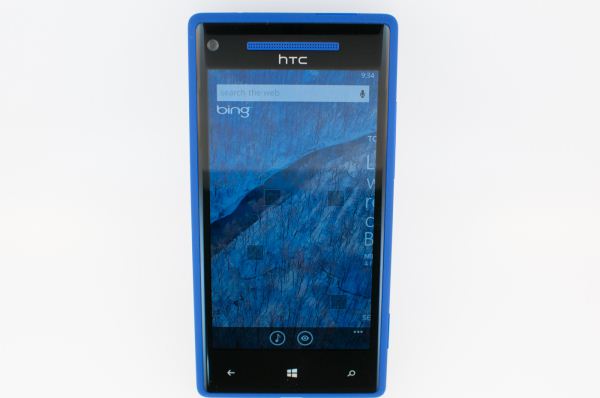Windows Phone 8 and Windows Phone 8X by HTC Preview
by Brian Klug on October 29, 2012 2:10 PM EST- Posted in
- Smartphones
- HTC
- Mobile
- windows phone 8
- Windows Phone 8X
- HTC 8X
- WP8
I titled this section final thoughts but left off the word conclusions because I feel that I need to spend longer with WP8 before really drawing any major conclusions - think of this as something of a big preview. At the same time, my first impressions and thoughts are indeed beginning to solidify. For the platform WP8 is absolutely an evolutionary step, rather than another dramatic re-imagining of Microsoft's vision for smartphones. Reimagining the start screen and including another size of live tiles is a nice touch, but the majority of the WP8 interface is the same as it was before. In fact, the most dramatic of changes with WP8 aren't even really visible to end users immediately with the move to the NT based kernel - the fruits of that move will only come later on in the future of the platform with increased hardware portability, better performance, and easier execution for OEMs and silicon vendors.
Anand made this great observation a while back that each platform was ultimately a reflection of the desktop position of the company behind it. For Google's smartphone platform, that means a full standalone computing environment complete with filesystem, since the search giant lacks its own desktop OS. Android essentially has to compensate for that lack of a real desktop platform by being everything. For iOS, what started as a clear evolution of the iPod has slowly evolved into a standalone platform, but still separate and distinct from OS X. iOS on an iPad for example can exist without a desktop, but doesn't try to supplant one. For Windows Phone, I can't shake the feeling that Microsoft still views the smartphone story as an accessory to everything else - Xbox, Windows 8, and Windows RT. They're three very distinct strategies with subtle differences, but absolutely drive the software decisions that get made each update.
At the same time WP8 feels like a dramatic update over WP7.5, and I find myself wondering what position Windows Phone would be in had it launched with the NT kernel and with this overall platform. The reality is that WP7 was a time to market play and that at the same time Microsoft was busy porting all of the software to deliver a Windows RT, Windows 8, Windows Phone 8 trifecta. Now that it's upon us hopefully some of the real advantages of this triple play will finally be made clear, and to really be the judge of that I need to actually sit down with all three and experience it. From a feature perspective I just wish that WP8 had tweaked a few more things - fast app switching still is a view with JPEG-compressed screenshots and visible artifacts, there's no VPN support, and messaging needs support for more IM protocols to be truly useful. Application support has gotten better over time on Windows Phone, but now the big drive will be getting existing apps updated to support the new features like live tiles and faster app switching. The big question is how many Windows RT or Windows 8 apps developers will end up porting over to WP8, a process which should be relatively painless given the shared frameworks.
For what it is, WP8 is a great update. It brings us the framework necessary to finally get modern hardware for Windows Phone, and will launch with what is without a doubt the best hardware from OEM partners in the 8X and Lumia 920. My time with HTC's 8X has been extremely positive - I think they nailed the industrial design, in hand feel, and the right balance of features for a Windows Phone 8. The OS feels smoother than it ever has everywhere I look and in every app I've tried out.












95 Comments
View All Comments
Chaser - Tuesday, October 30, 2012 - link
Maybe in your iSheep blinded fanboi eyes. Try looking at Android for 10 minutes next time before you broadcast your ignorance again.Sabresiberian - Tuesday, October 30, 2012 - link
I have a friend in the cell phone business (so he gets to try out lots of phones), he told me "Get a Nokia 920." He likes the Windows phone much better than an Android one.I might just do that. Then again, I might wait, because I'm still not seeing the bleeding edge phones with Windows on them. This, in my opinion, is one of the biggest factors that has held Microsoft OS phones back from the beginning. After the Win 7 phones came out there were some nice phones released, but "nice" isn't what I want, and I think I speak for a lot of people - we want the best smart phone we can get, and if it's Android then most people will buy it because it's a better phone, OS is secondary.
I mean, of all the phones I've seen reviewed here, the Note II looks like the best fit for me - but I want a Windows phone, so where does that leave me?
Still waiting, that's where.
;)
karasaj - Tuesday, October 30, 2012 - link
Well the hardware is basically identical. The best hardware out right now is the S4 (or the A6) with S4 pro just barely on the horizon and Tegra 4 months away. Windows phone has that. A lot of the flagship windows phones have their own things too. HTC has an amplifier for sound, and a never been done 2.1? (or 2.0?) MP front facing wide camera. Nokia has an insane (and also never been done except by them) 8.7MP camera that is WAY ahead of other phones. And wireless charging.But those innovations might not mean much to you depending on how much you use your phone. I'm interested in the 8X because I skype a lot, but the Lumia sounds nice because of Nokia's apps, as well as the charging (interesting) and the camera (insanely good). They're definitely innovative, but "best hardware" is subjective. The underlying SoC is the same, but some of the software/other parts of the hardware are really what makes the difference.
Dorek - Friday, November 2, 2012 - link
The 920 is bleeding edge hardware. The camera is an evolutionary leap above other smartphone cameras.wrack - Tuesday, October 30, 2012 - link
Does WP8 have orientation lock setting? I hate it when the screen rotates when I am reading news on the bed lying on side.karocage - Tuesday, October 30, 2012 - link
I thought it was interesting that you say there was a lot of debate about removing the "unused space" on WP7's home screen, because as is obvious to anyone who thinks about it for 5 seconds, that empty space allows you to see more items simultaneously than you can on WP8.Of course, the smaller tile size means you can see more items on WP8, but WP7 layout + WP8 smaller tiles size would maximize information density. The symmetry must be purely for marketing as seemed to be implied. Too bad. Less distinctive and less functional.
von Krupp - Tuesday, October 30, 2012 - link
Also less intuitive. There is no arrow to tell new Windows Phone users that more is to be had with a swipe to the left (or a tap on said arrow). If they wanted to better utilize that black space, they could have added charms for such items as search or settings, things that would actually get used often enough to warrant such a position.I do not like the new Start Screen at all, let alone the overall lack of change to the UI. Too many missed opportunities.
dagamer34 - Tuesday, October 30, 2012 - link
The arrow shows up when you scroll to the bottom.von Krupp - Wednesday, October 31, 2012 - link
In that case, I stand corrected on the "intuitive" part regarding the home screen.Still, I feel it lacks the character of the original.
Having put some more thought into it from the last post, I feel like a better use of the black area would have been charms representing programs running in the background...almost like the jump-lists from desktop Windows 7. Inside of an application, dragging the ellipsis would not only bring up the host of options, but the side bar as well.
Larger tiles just seems like a wasted opportunity. Almost lazily so.
jamyryals - Wednesday, October 31, 2012 - link
Larger tiles? The large tile and medium tiles were both in WP7. The new tile is the small one.The new home screen is better.